Zscaler Bundle
How Did Zscaler Conquer the Cloud Security Market?
Zscaler revolutionized cybersecurity by pioneering a cloud-first approach, but how did they actually get customers and build such a strong brand? This deep dive explores Zscaler's dynamic sales and marketing strategies, revealing the tactics behind its remarkable growth. From championing the 'Zero Trust' model to building a robust Zscaler SWOT Analysis, we'll uncover the secrets of their success.
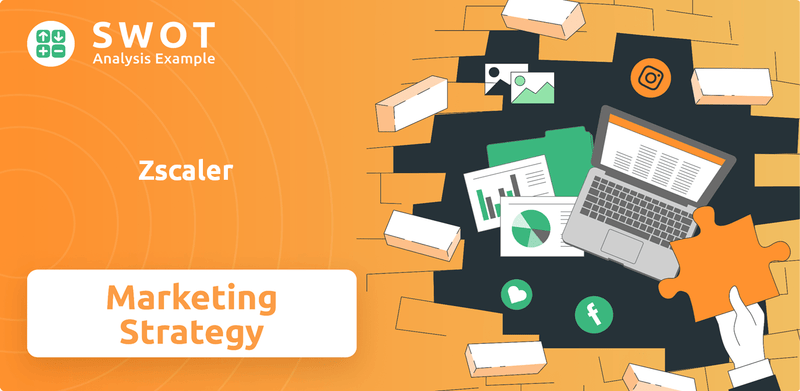
This analysis will dissect Zscaler's Zscaler sales strategy, including its Zscaler sales process for enterprise clients and the structure of its Zscaler sales team structure. We'll also examine its Zscaler marketing strategy, including its Zscaler marketing campaigns for cloud security, lead generation methods, and utilization of Zscaler marketing automation tools. Understanding these strategies is crucial for anyone interested in Zscaler cybersecurity, Zscaler cloud security, and the overall Zscaler platform.
How Does Zscaler Reach Its Customers?
The sales and marketing strategy of Zscaler centers around a multi-channel approach, blending direct enterprise sales with a robust partner ecosystem. This strategy is designed to maximize market penetration and cater to diverse customer needs within the cybersecurity landscape. The company's go-to-market strategy focuses on building strong relationships with large enterprises while simultaneously expanding its reach through strategic partnerships.
Zscaler's primary sales channels include a direct sales team that focuses on major accounts, and an indirect channel comprising value-added resellers (VARs), system integrators (SIs), and managed security service providers (MSSPs). These channels work in tandem to deliver Zscaler's cloud security solutions. The company's approach is geared towards providing comprehensive security solutions and ensuring that its platform is accessible to a broad customer base.
The evolution of Zscaler's sales channels reflects a strategic shift towards strengthening its partner ecosystem to accelerate market penetration. While direct sales remain foundational for strategic accounts, the growing reliance on partners reflects a recognition of their ability to broaden market coverage and deliver integrated solutions. Zscaler's partner program, known as the Zscaler Alliance, focuses on empowering partners with training, resources, and incentives to drive adoption of its Zero Trust Exchange platform.
Zscaler's direct sales team targets large enterprises, focusing on building deep customer relationships and providing tailored solutions. This channel is crucial for securing high-value cybersecurity contracts and understanding complex security requirements. The direct sales approach allows for a more personalized service, ensuring that the specific needs of each client are addressed effectively.
The indirect sales channel includes VARs, SIs, and MSSPs, which extend Zscaler's market reach. These partners provide localized expertise and implementation support, expanding Zscaler's presence across various segments and geographies. This channel is essential for scaling operations and providing comprehensive solutions to a wider audience.
The Zscaler Alliance is a key component of the company's partner program, providing partners with training, resources, and incentives. This program is designed to drive the adoption of Zscaler's Zero Trust Exchange platform. By empowering its partners, Zscaler ensures that its solutions are effectively marketed and implemented across various markets.
Strategic alliances with cloud providers like Microsoft Azure and Amazon Web Services (AWS) are instrumental for Zscaler. These partnerships enable seamless security integrations within cloud environments, enhancing market share. These collaborations ensure that Zscaler's security capabilities are embedded within the broader cloud ecosystem.
Zscaler's focus on these channels is evident in its continued revenue growth. Subscription services revenue increased by 33% year-over-year to $536.2 million in Q3 FY24, indicating the effectiveness of its sales distribution model. This growth reflects the success of Zscaler's sales and marketing efforts, which are designed to capture a larger portion of the cybersecurity market. For more insights, read about the Growth Strategy of Zscaler.
Zscaler's sales strategy emphasizes a multi-channel approach to maximize market penetration and cater to diverse customer needs. The company leverages direct enterprise sales and a robust partner ecosystem to ensure comprehensive market coverage and customer support. This approach is supported by strategic partnerships and a strong focus on customer acquisition cost.
- Direct sales for large enterprises and strategic accounts.
- Indirect sales through VARs, SIs, and MSSPs.
- Strategic partnerships with cloud providers like Microsoft Azure and AWS.
- Emphasis on the Zscaler Alliance to empower partners.
Zscaler SWOT Analysis
- Complete SWOT Breakdown
- Fully Customizable
- Editable in Excel & Word
- Professional Formatting
- Investor-Ready Format
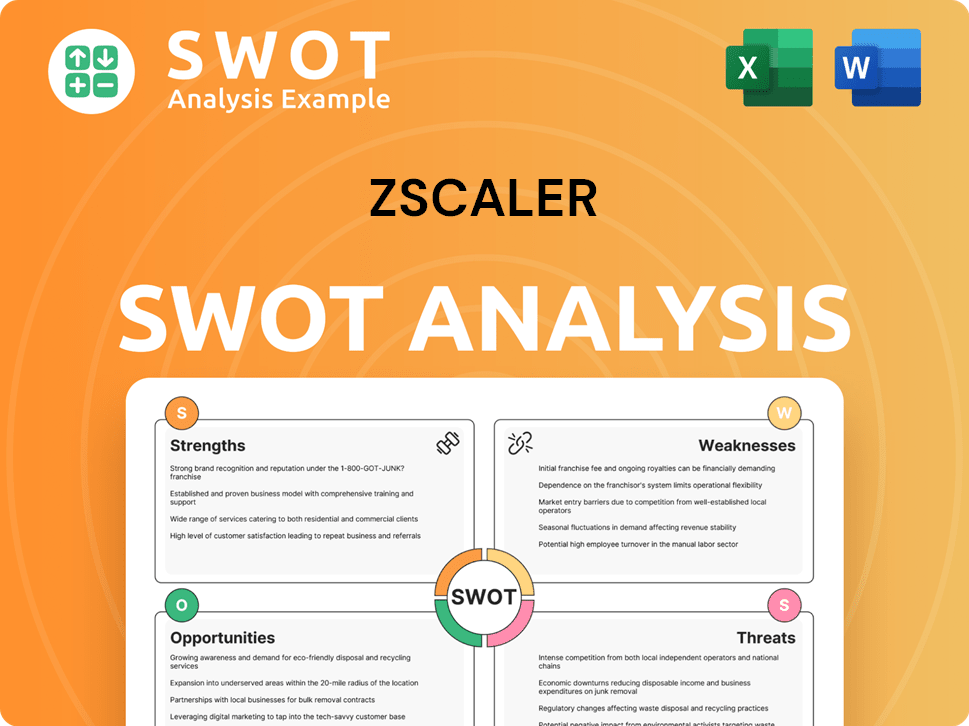
What Marketing Tactics Does Zscaler Use?
The marketing tactics employed by the company are heavily focused on digital strategies to build brand awareness, generate leads, and boost sales within the enterprise cybersecurity market. Their approach is data-driven, using analytics to track campaign performance and optimize marketing spend. This strategy has been instrumental in establishing the company as a leader in cloud security.
Content marketing is a cornerstone of their strategy, with regular publications of thought leadership articles, whitepapers, and webinars. This positions the company as an authority in the field. SEO plays a critical role in ensuring this valuable content is discoverable by organizations actively searching for security solutions, driving organic traffic to their website.
The company also utilizes paid advertising, email marketing, and social media platforms to reach key decision-makers and engage with the cybersecurity community. They actively participate in industry events and webinars to provide opportunities for direct engagement with potential customers. This comprehensive approach supports their target market strategy.
The company heavily invests in content marketing, producing a wealth of resources like whitepapers, webinars, and research reports. This strategy aims to educate potential customers about cloud security. This approach helps to establish the company as a thought leader in the industry.
SEO is a critical component, ensuring that their valuable content is easily found by organizations searching for security solutions. They utilize paid advertising campaigns on platforms like LinkedIn to reach key decision-makers. These strategies help to drive organic traffic and generate high-quality leads.
Email marketing is used for lead nurturing, delivering personalized content based on engagement and expressed interests. The company also engages with industry analysts and experts to amplify its message. This approach helps to build relationships and drive conversions.
Social media platforms, particularly LinkedIn and X, are used for brand building and sharing industry insights. The company actively participates in industry events and webinars. This helps to engage with the cybersecurity community.
The company uses analytics tools to track campaign performance and optimize marketing spend. Customer segmentation allows for tailored messaging to different industries or company sizes. This data-driven approach ensures efficient resource allocation.
The marketing mix has evolved from educating the market about cloud security to emphasizing the benefits of their Zero Trust Exchange platform. They have introduced interactive tools to engage prospects. This helps to highlight the comprehensive value of their offerings.
The company's marketing tactics are designed to create a strong presence in the enterprise cybersecurity market. Their strategies focus on content marketing, SEO, and targeted advertising to generate leads and build brand awareness. These tactics include:
- Content Marketing: Publishing thought leadership articles, whitepapers, and webinars on topics like Zero Trust and cloud security.
- SEO: Optimizing content to ensure discoverability by organizations searching for security solutions.
- Paid Advertising: Running targeted digital campaigns on platforms like LinkedIn to reach key decision-makers.
- Email Marketing: Utilizing email for lead nurturing and delivering personalized content.
- Social Media: Engaging with the cybersecurity community on platforms like LinkedIn and X.
- Industry Events: Participating in and hosting events and webinars for direct customer engagement.
Zscaler PESTLE Analysis
- Covers All 6 PESTLE Categories
- No Research Needed – Save Hours of Work
- Built by Experts, Trusted by Consultants
- Instant Download, Ready to Use
- 100% Editable, Fully Customizable
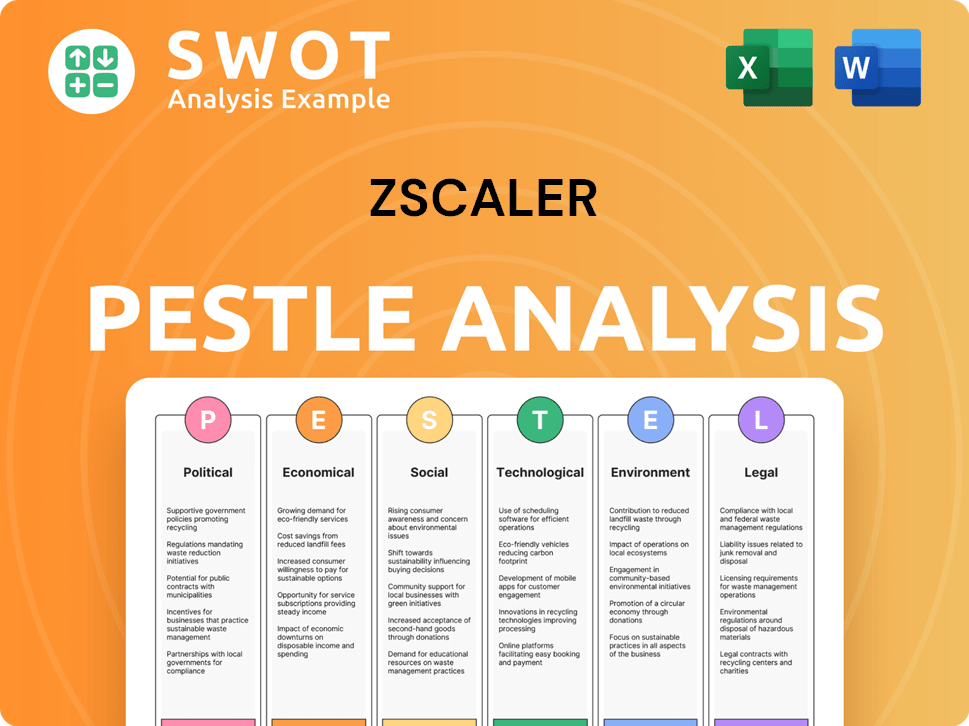
How Is Zscaler Positioned in the Market?
The brand positioning of the company is deeply rooted in its pioneering role in cloud-native security. Its core message revolves around securely connecting users to applications, regardless of location, eliminating the need for traditional network perimeters. This approach differentiates it from competitors, emphasizing its innovative solutions and commitment to the Zero Trust security model.
The company's visual identity is modern and technologically advanced, reflecting its innovative solutions. The tone of voice is authoritative and reassuring, positioning it as a trusted advisor in the complex cybersecurity landscape. The company consistently targets large enterprises and government organizations, highlighting its innovation, scalability, and superior security posture, which helps accelerate digital transformation while mitigating cyber risks.
The company's consistent recognition by leading industry analysts, such as Gartner and Forrester, validates its brand perception. For example, the company was recognized as a Leader in the 2024 Gartner Magic Quadrant for Security Service Edge (SSE). This recognition reinforces its market position and credibility within the cybersecurity industry. Furthermore, the company's brand consistency is meticulously maintained across all channels, ensuring a unified brand experience for its customers.
The core message centers on securely connecting the right user to the right application, regardless of location. This eliminates the need for traditional network perimeters. This focus on Zero Trust and cloud-native security differentiates the company in the market.
The primary target audience includes large enterprises and government organizations. The company's platform addresses their need for robust security and digital transformation. The company's focus allows it to tailor its Zscaler sales strategy and Zscaler marketing strategy effectively.
Brand consistency is maintained across all channels, from its website to customer support. This ensures a unified and coherent brand experience. The company's consistent messaging reinforces its position as a leader in Zscaler cybersecurity.
The company's unique selling proposition includes innovation, scalability, and superior security. This helps organizations accelerate digital transformation. The company's platform offers a compelling blend of business enablement and robust security.
The company's brand positioning is built on several key elements that contribute to its success in the market. These elements include a clear value proposition, consistent messaging, and strong industry recognition.
- Innovation: The company consistently introduces new features and capabilities to its platform.
- Scalability: The platform is designed to handle the needs of large enterprises.
- Security: The company emphasizes its superior security posture.
- Expertise: The company positions itself as a trusted advisor in cybersecurity.
- Recognition: The company has been recognized as a leader in the industry.
The company's value proposition focuses on providing a secure and scalable cloud-based platform. It helps organizations accelerate digital transformation while mitigating cyber risks. This approach is central to its Zscaler cloud security offerings.
Consistent messaging across all channels reinforces the company's brand identity. This includes its website, marketing materials, and sales presentations. This consistency supports its Zscaler go-to-market strategy.
Recognition from industry analysts, such as Gartner and Forrester, validates its brand perception. These recognitions help build trust and credibility. This supports the company's Zscaler platform adoption.
The company differentiates itself through its cloud-native architecture and Zero Trust approach. This contrasts with competitors who offer hybrid solutions. This differentiation is key to its Zscaler sales process for enterprise.
The company focuses on delivering a positive customer experience through its platform. This includes ease of use, robust support, and continuous innovation. This focus influences its Zscaler marketing campaigns for cloud security.
The company adapts to changes in the cybersecurity landscape, such as AI-driven threats. It highlights its AI-powered threat detection capabilities. This responsiveness is critical for its Zscaler product positioning.
The company's brand positioning is further supported by its strategic approach to sales and marketing. The company's sales team is structured to target specific customer segments, and its marketing efforts are focused on generating leads and building brand awareness. The company utilizes various Zscaler marketing automation tools to streamline its marketing processes and improve its efficiency. The company's pricing strategy is competitive, and it continuously monitors its Zscaler customer acquisition cost to ensure profitability. To understand the revenue streams and business model further, one can refer to the article about Revenue Streams & Business Model of Zscaler.
Zscaler Business Model Canvas
- Complete 9-Block Business Model Canvas
- Effortlessly Communicate Your Business Strategy
- Investor-Ready BMC Format
- 100% Editable and Customizable
- Clear and Structured Layout
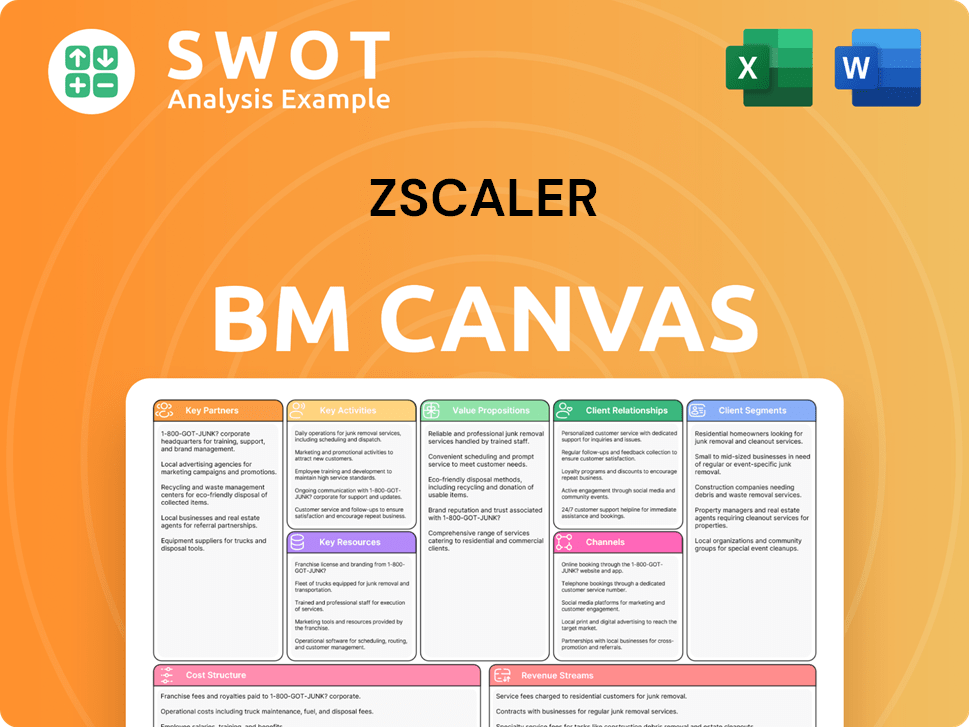
What Are Zscaler’s Most Notable Campaigns?
The Zscaler marketing strategy has been significantly shaped by its key campaigns. These campaigns are designed to promote its 'Zero Trust' security model and the benefits of its platform. The company's go-to-market approach leverages content marketing, webinars, and industry events to reach its target audience. This strategy has contributed to the company's growth and market leadership in cloud security.
A core element of the Zscaler sales strategy involves highlighting the advantages of its Zero Trust Exchange platform, especially in the context of Secure Access Service Edge (SASE). These campaigns aim to demonstrate how the platform simplifies security, reduces complexity, and lowers costs. By focusing on specific industry challenges like securing generative AI and protecting against ransomware, Zscaler showcases the immediate relevance and effectiveness of its solutions. These initiatives are part of Zscaler's broader effort to establish itself as a leader in Zscaler cybersecurity.
The company's approach also includes agile campaigns that respond to current threat landscapes, demonstrating the effectiveness of its platform. Collaborations with cybersecurity research firms and industry analysts boost the credibility of these campaigns. While specific campaign metrics are proprietary, Zscaler's continued growth in customer base and revenue testifies to the effectiveness of its strategic marketing initiatives. The company's success is also reflected in its financial performance, with a 30% year-over-year increase in calculated billings to $680.9 million in Q3 FY24.
A defining campaign for Zscaler has been its continuous promotion of the 'Zero Trust' security model. This sustained effort has been crucial to establishing its brand identity and market leadership. The objective was to shift the industry's focus from perimeter-based security to a model that never assumes trust. This campaign is a core part of the Zscaler marketing strategy.
Recent campaigns emphasize the consolidation benefits of the Zero Trust Exchange platform within the Secure Access Service Edge (SASE) framework. These initiatives aim to showcase how Zscaler's platform can replace multiple point products, thus reducing complexity and cost. This is a key element of the Zscaler go-to-market approach.
Zscaler also focuses on campaigns addressing specific industry challenges, such as securing generative AI and protecting against ransomware. These campaigns are agile and responsive, using current threat landscapes to show the platform's immediate relevance. These are critical to the Zscaler sales strategy.
The company utilizes various channels including digital ads, solution briefs, customer success stories, and webinars. Zscaler also leverages industry conferences like RSA and Black Hat for direct enterprise outreach. These efforts contribute to lead generation and platform adoption. You can learn more about the company's approach in an article about [Zscaler's marketing strategy](0).
Zscaler Porter's Five Forces Analysis
- Covers All 5 Competitive Forces in Detail
- Structured for Consultants, Students, and Founders
- 100% Editable in Microsoft Word & Excel
- Instant Digital Download – Use Immediately
- Compatible with Mac & PC – Fully Unlocked
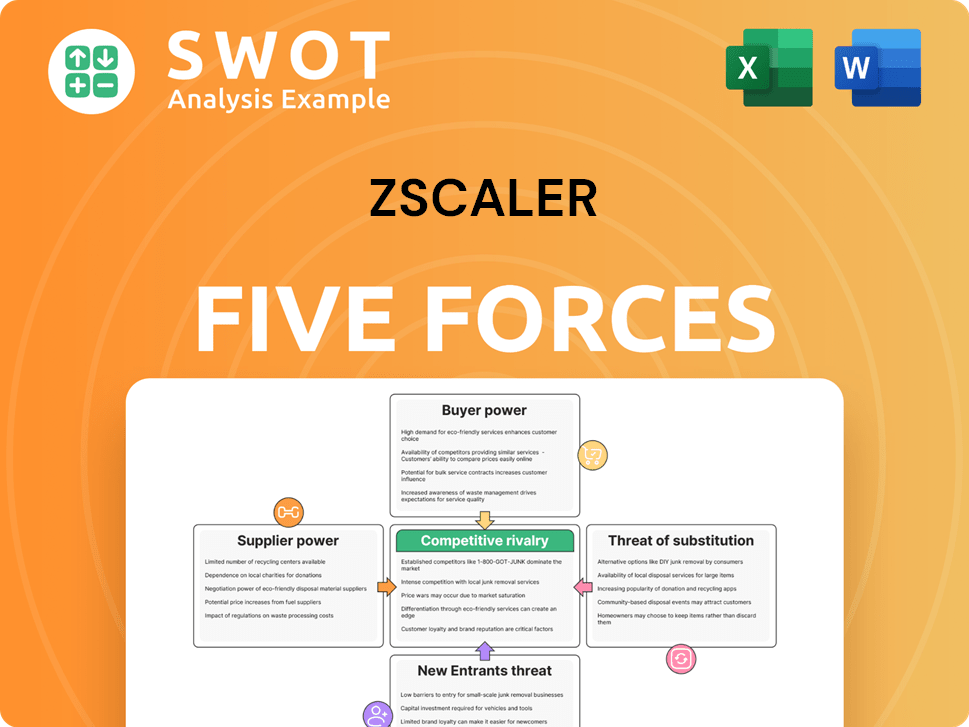
Related Blogs
- What are Mission Vision & Core Values of Zscaler Company?
- What is Competitive Landscape of Zscaler Company?
- What is Growth Strategy and Future Prospects of Zscaler Company?
- How Does Zscaler Company Work?
- What is Brief History of Zscaler Company?
- Who Owns Zscaler Company?
- What is Customer Demographics and Target Market of Zscaler Company?
Disclaimer
All information, articles, and product details provided on this website are for general informational and educational purposes only. We do not claim any ownership over, nor do we intend to infringe upon, any trademarks, copyrights, logos, brand names, or other intellectual property mentioned or depicted on this site. Such intellectual property remains the property of its respective owners, and any references here are made solely for identification or informational purposes, without implying any affiliation, endorsement, or partnership.
We make no representations or warranties, express or implied, regarding the accuracy, completeness, or suitability of any content or products presented. Nothing on this website should be construed as legal, tax, investment, financial, medical, or other professional advice. In addition, no part of this site—including articles or product references—constitutes a solicitation, recommendation, endorsement, advertisement, or offer to buy or sell any securities, franchises, or other financial instruments, particularly in jurisdictions where such activity would be unlawful.
All content is of a general nature and may not address the specific circumstances of any individual or entity. It is not a substitute for professional advice or services. Any actions you take based on the information provided here are strictly at your own risk. You accept full responsibility for any decisions or outcomes arising from your use of this website and agree to release us from any liability in connection with your use of, or reliance upon, the content or products found herein.